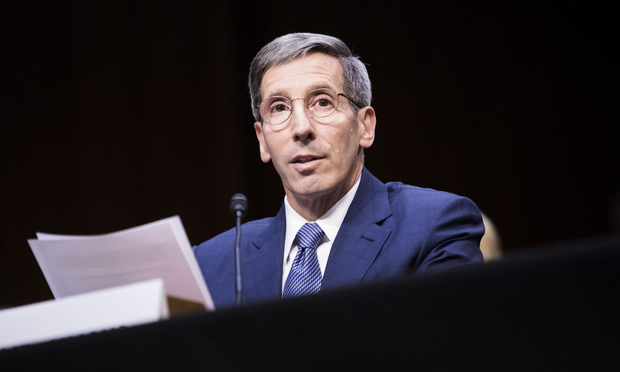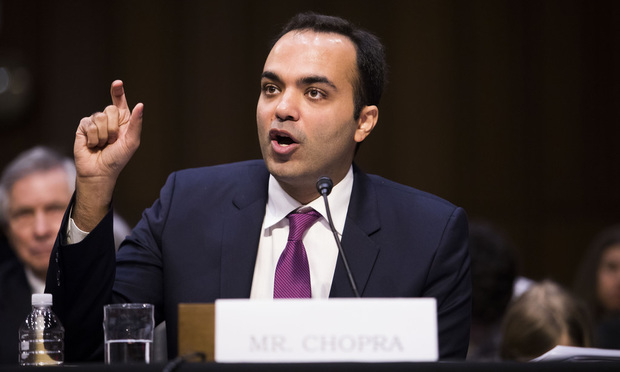So Much for 'Consensus': Big Law Pick for Consumer Chief Divides FTC
Andrew Smith joins the FTC from Covington & Burling. FTC chair Joe Simons said Wednesday he was “disappointed that two of my new colleagues have chosen to turn Mr. Smith's appointment into a source of unnecessary controversy.”
May 17, 2018 at 03:01 PM
6 minute read
 Joseph Simons, formerly of Paul Weiss, testifies at his confirmation hearing to lead the FTC. Credit: Diego M. Radzinschi / NLJ
Joseph Simons, formerly of Paul Weiss, testifies at his confirmation hearing to lead the FTC. Credit: Diego M. Radzinschi / NLJ In preparation for his February confirmation hearing, Joseph Simons drafted an opening statement that included what has become something of an applause-line for political events related to the Federal Trade Commission: a nod to the agency's tradition of working by consensus.
But by the time his turn came to speak, senators had already beaten Simons, a former antitrust partner at Paul, Weiss, Rifkind, Wharton & Garrison, to the punch. When he turned to that tradition in his remarks, the Trump administration's pick to lead the agency said, “as has already been discussed, one of the great things about the FTC's mission historically is that it has been performed in a highly bipartisan way.”
Just two weeks into their tenures together, Simons and his fellow commissioners are testing that ethos. The five-member commission this week only narrowly approved the appointment of Covington & Burling partner Andrew Smith as the director of the FTC's bureau of consumer protection, with the two Democrats dissenting over concerns about the recusals that will arise from his record as a corporate defense lawyer.
In private practice, Smith represented Facebook and Equifax—companies that are now facing two of the FTC's highest-profile investigations: the social media company for its privacy practices and the credit agency for a massive data breach affecting millions of U.S. residents.
In a prepared statement, Simons said Wednesday he was “disappointed that two of my new colleagues have chosen to turn Mr. Smith's appointment into a source of unnecessary controversy.”
The early dustup has struck FTC alumni as uncharacteristically political for the agency and possibly even unprecedented. Traditionally, agency veterans said in interviews with The National Law Journal, the FTC chairman selects bureau directors and the votes on their appointments are treated as pro forma matters.
“This is really aberrational in terms of having fresh new commissioners coming in at the same time. I think it's unfortunate that there's this kerfuffle,” said Georgetown law professor David Vladeck, who served from 2009 to 2012 as the director of the FTC's bureau of consumer protection. “These votes are traditional but they're not required, as I understand it. The chair has the ability to appoint whomever he or she wants as key agency personnel, but I think it's an important tradition [to hold votes].”
Vladeck added that there is “no question” that Smith, a Covington partner since 2014, is qualified to lead the consumer protection bureau.
The divided vote on Smith's appointment reflects the arrival of four new commissioners who don't have prior experience working together, Vladeck said.
At the February confirmation hearing, Simons appeared alongside three other nominees, including two Republicans—former Delta Air Lines executive Christine Wilson and Noah Phillips, a former chief counsel to U.S. Sen. John Cornyn—and Rohit Chopra, a consumer advocate picked for a Democratic seat. All four were confirmed in late April along with a Democratic nominee, Rebecca Slaughter, who previously served as chief counsel to Senate Minority Leader Chuck Schumer. (Wilson has not yet taken her seat, which Commissioner Maureen Ohlhausen is holding onto as she awaits confirmation to a the Federal Claims Court.)
Smith, like many agency officials who take posts from a big law firm, will face recusal issues for matters he worked on or Covington handled.
 FTC's Rohit Chopra, testifies before the Senate Committee on Commerce, Science, and Transportation. Credit: Diego M. Radzinschi / National Law Journal
FTC's Rohit Chopra, testifies before the Senate Committee on Commerce, Science, and Transportation. Credit: Diego M. Radzinschi / National Law Journal Without naming any specific investigations, Chopra said Wednesday that he opposed Smith's appointment because he “may be unable to participate in some of the FTC's high-profile and consequential matters.”
“The director should be our quarterback on the agency's top priorities,” Chopra said in a prepared statement. “But, I fear our quarterback will be spending too much time on the sidelines.”
Chopra said Simons' selection of Smith was a “break with precedent.” He noted that past senior leadership picks drew unanimous, bipartisan support. “Our most critical personnel pick was made without a commission meeting. I don't believe this is an effective model for decision-making, particularly given our agency's long track record of reaching consensus,” Chopra said. “I'm hopeful it is one we will not repeat.”
Chopra and Slaughter supported Simons' selections for other senior posts, including his pick of Alden Abbott for general counsel and Bruce Hoffman for director of the competition bureau. Hoffman previously worked for Shearman & Sterling and Hunton & Williams. Abbott formerly was senior legal fellow and deputy director of the Heritage Foundation's Meese Center for Legal and Judicial Studies.
As the commissioners continue to work together, Vladeck said time will help them find the consensus. The “hydraulic pressure” of the FTC's bipartisan track record, he said, is strong.
“It will take a little working together before the bonds sort of form and the ethos is restored,” he said. “I have no doubt six months from now that people will not remember this episode.”
Simons, for his part, appeared willing to give consensus a shot. Appearing before a Senate appropriations panel Thursday, the chairman said he and his fellow commissioners “look forward to continuing the agency's longstanding tradition of bipartisanship, collegiality and cooperation.”
“And we are proud of our track record,” he said.
Read more:
Joe Simons of Paul Weiss, FTC Chair Pick, Reports $1.9M Partner Share
FTC Nominee Christine Wilson Discloses Her In-House Earnings at Delta
At Gibson Dunn, This Facebook Lawyer Inked FTC Privacy Deal Now in Spotlight
What FTC Nominees Said About the Equifax Data Breach
Trip to the Soviet Bloc Shaped This FTC Nominee, and Other Disclosure Tidbits
This content has been archived. It is available through our partners, LexisNexis® and Bloomberg Law.
To view this content, please continue to their sites.
Not a Lexis Subscriber?
Subscribe Now
Not a Bloomberg Law Subscriber?
Subscribe Now
NOT FOR REPRINT
© 2025 ALM Global, LLC, All Rights Reserved. Request academic re-use from www.copyright.com. All other uses, submit a request to [email protected]. For more information visit Asset & Logo Licensing.
You Might Like
View All
Bankruptcy Judge Clears Path for Recovery in High-Profile Crypto Failure
3 minute read
Government Attorneys Face Reassignment, Rescinded Job Offers in First Days of Trump Administration
4 minute read
DC Judge Chutkan Allows Jenner's $8M Unpaid Legal Fees Lawsuit to Proceed Against Sierra Leone
3 minute readTrending Stories
- 1Some Thoughts on What It Takes to Connect With Millennial Jurors
- 2Artificial Wisdom or Automated Folly? Practical Considerations for Arbitration Practitioners to Address the AI Conundrum
- 3The New Global M&A Kings All Have Something in Common
- 4Big Law Aims to Make DEI Less Divisive in Trump's Second Term
- 5Public Notices/Calendars
Who Got The Work
J. Brugh Lower of Gibbons has entered an appearance for industrial equipment supplier Devco Corporation in a pending trademark infringement lawsuit. The suit, accusing the defendant of selling knock-off Graco products, was filed Dec. 18 in New Jersey District Court by Rivkin Radler on behalf of Graco Inc. and Graco Minnesota. The case, assigned to U.S. District Judge Zahid N. Quraishi, is 3:24-cv-11294, Graco Inc. et al v. Devco Corporation.
Who Got The Work
Rebecca Maller-Stein and Kent A. Yalowitz of Arnold & Porter Kaye Scholer have entered their appearances for Hanaco Venture Capital and its executives, Lior Prosor and David Frankel, in a pending securities lawsuit. The action, filed on Dec. 24 in New York Southern District Court by Zell, Aron & Co. on behalf of Goldeneye Advisors, accuses the defendants of negligently and fraudulently managing the plaintiff's $1 million investment. The case, assigned to U.S. District Judge Vernon S. Broderick, is 1:24-cv-09918, Goldeneye Advisors, LLC v. Hanaco Venture Capital, Ltd. et al.
Who Got The Work
Attorneys from A&O Shearman has stepped in as defense counsel for Toronto-Dominion Bank and other defendants in a pending securities class action. The suit, filed Dec. 11 in New York Southern District Court by Bleichmar Fonti & Auld, accuses the defendants of concealing the bank's 'pervasive' deficiencies in regards to its compliance with the Bank Secrecy Act and the quality of its anti-money laundering controls. The case, assigned to U.S. District Judge Arun Subramanian, is 1:24-cv-09445, Gonzalez v. The Toronto-Dominion Bank et al.
Who Got The Work
Crown Castle International, a Pennsylvania company providing shared communications infrastructure, has turned to Luke D. Wolf of Gordon Rees Scully Mansukhani to fend off a pending breach-of-contract lawsuit. The court action, filed Nov. 25 in Michigan Eastern District Court by Hooper Hathaway PC on behalf of The Town Residences LLC, accuses Crown Castle of failing to transfer approximately $30,000 in utility payments from T-Mobile in breach of a roof-top lease and assignment agreement. The case, assigned to U.S. District Judge Susan K. Declercq, is 2:24-cv-13131, The Town Residences LLC v. T-Mobile US, Inc. et al.
Who Got The Work
Wilfred P. Coronato and Daniel M. Schwartz of McCarter & English have stepped in as defense counsel to Electrolux Home Products Inc. in a pending product liability lawsuit. The court action, filed Nov. 26 in New York Eastern District Court by Poulos Lopiccolo PC and Nagel Rice LLP on behalf of David Stern, alleges that the defendant's refrigerators’ drawers and shelving repeatedly break and fall apart within months after purchase. The case, assigned to U.S. District Judge Joan M. Azrack, is 2:24-cv-08204, Stern v. Electrolux Home Products, Inc.
Featured Firms
Law Offices of Gary Martin Hays & Associates, P.C.
(470) 294-1674
Law Offices of Mark E. Salomone
(857) 444-6468
Smith & Hassler
(713) 739-1250









